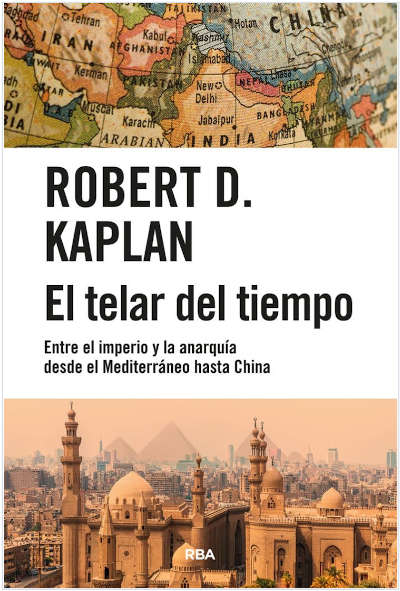In the picture
Cover of Robert Kaplan's book 'El telar del tiempo' (Barcelona: RBA, 2024) 398 pages
Robert D. Kaplan's new book has the most essential characteristics of a mature work. As in most of his writings, geography and the geopolitics that derive from it, often delivered at core topic as a travelogue, occupy the reflections of this American journalist who continually goes back and forth from history to the present and back again.
In 'The Loom of Time', an expression borrowed from the great British historian Arnold Toynbee, Kaplan also presents a journey -this time along the Great Middle East, from Egypt to Central Asia, in fact in discontinuous visits-, but he also reflects on a transcendent fundamental question, on which he makes a very politically incorrect bet, only possible perhaps in a maturity that neglects what people will say: we should not impose democracy on countries whose internal processes, whether peaceful or revolutionary, do not favor it; it is better to have authoritarian regimes that are the least arbitrary possible than a status of anarchy in which the fear of not knowing what to do completely annihilates the lives of the people. In international politics, we must "aim at what is possible rather than what is merely fair," he says. He says this from the point of view of "realist" thinking in international relations, which he has always defended, as opposed to the "idealistic ecstasies", as he describes the excesses of the opposite current, which in Washington have led to many failed military operations.
Kaplan sustains this reflection on a heartfelt confession: his mistake in supporting the US invasion in 2003 to overthrow Saddam Hussein, which transformed a particularly bloody dictatorship into something even worse: an anarchy in which the suffering was even greater. In these twenty years the author had already expressed his 'mea culpa' on other occasions, but here he does so in a more detailed and reasoned way. He regrets having "failed as a realist". He claims that having known Saddam's regime at close quarters - it was on a trip there that he felt the greatest fear of his life - he believed that his overthrow could only bring about something better, and it did not. Not that he thinks the anarchy that followed was the fault of America's undeniable ineptitude in the management of its invasion, for he believes that, had the invasion not occurred, the Arab Spring of 2011 would have meant the same chaos in Iraq as that experienced in Syria. "Unfortunately, any state subject is almost always better than no state at all," he concludes. In a way, all this consideration comes to close an inner process that Kaplan began to embrace in his mind when at the end of the Cold War he wrote the book 'The Coming Anarchy. Shattering the Dreams of the Post Cold War' (2000).
The degree scroll of 'The Loom of Time' alludes to the importance of looking into history, into the making of peoples, to try to understand the present and glimpse something of the future: the way the deep currents of the seas ultimately determine written request the waves that manifest themselves on the surface. That is why Kaplan's journey through the Greater Middle East is replete with incursions into the ancient history of the nations he visit, alternating these wide-angle visions with the more contemporary interpretations that various of the author's interlocutors convey to him in the conversations he transcribes.
Based on geography and the realities it shapes, Kaplan assesses the cohesion of Egypt as a nation, the more federative character of Ethiopia, the internal incoherence of Syria and Iraq, and the possibilities of Iran and Afghanistan. On Saudi Arabia, he warns that any attempt to force a democratization of the country would very possibly lead to Islamism, so perhaps a modernizing regime like the current one, which is incorporating some freedoms, would be better.
As for Iran, Kaplan is sample optimistic about the possibility of a counterrevolution. He says that the ayatollahs' regime is "at the beginning of the end." In writing this, he may have been carried away by the impact of the popular demonstrations in the country in 2022, when the book ended (it was published in English in 2023). In any case, he makes these appreciations in a context in which he advocates applying imagination. "In geopolitics and in understanding our world, the most powerful tool is imagination," he warns. "There are things we know are possible, but we simply cannot palpably imagine how exactly they would happen, and so in our thinking we dismiss them." A change in Iran, which because of its sophistication as a nation is less at risk of descending into chaos, would be an engine of positive transformation for the entire Middle East.
Finally, when referring to Central Asia, Kaplan does so as a whole, replacing the details of his personal experiences with a global geopolitical reflection that serves as the book's colophon. With its growing presence in that region, through the laying of railroads, highways and oil pipelines as part of its Belt and Road Initiative, China is in a position to attempt to control the great Eurasian hinterland that Mackinder, the father of geopolitics, called the World Island, control of which would ensure global dominance. Precisely the whole struggle of the United States in World War II and the Cold War was to prevent any one power from dominating Central Asia.
If in his immediately preceding books - 'The Tragic Mentality' and 'Adriatic' - Kaplan had shown an intellectualism beyond perhaps the expectation of more down-to-earth readers, 'The Loom of Time' returns to geopolitical considerations of great practical interest.

